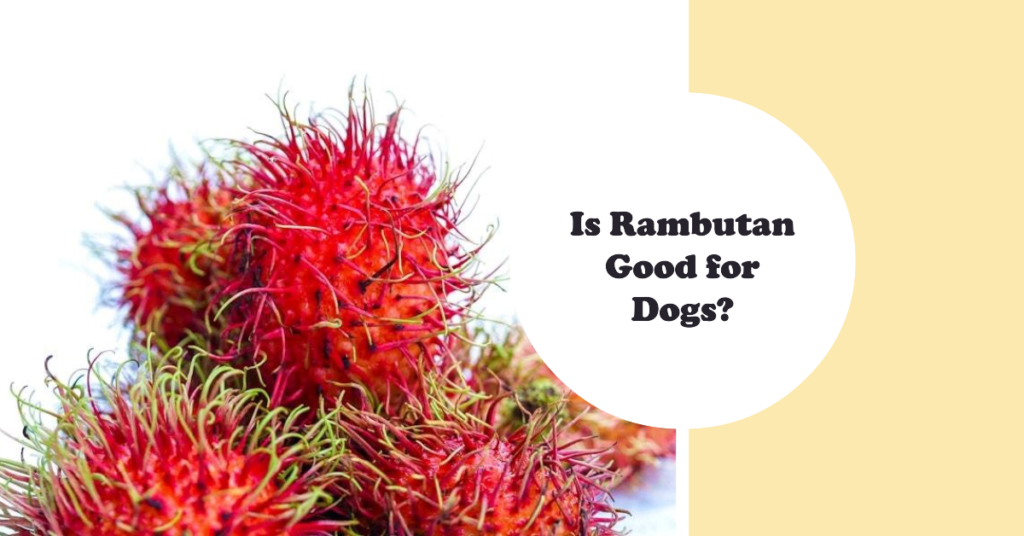If you’re a dog owner and enjoy trying new fruits, you may have come across the exotic rambutan. With its spiky exterior and juicy flesh, rambutan is a tropical fruit that sparks curiosity. But before you share a taste with your furry friend, it’s important to consider whether rambutan is safe for dogs. In this article, we’ll explore the potential benefits and risks of feeding rambutan to dogs, shedding light on the subject of rambutan and its impact on our beloved pets.

What is Rambutan?
Rambutan is a tropical fruit that is native to Southeast Asia. It belongs to the family Sapindaceae and is closely related to the lychee and longan fruits. The name “rambutan” comes from the Malay word for “hairy,” which describes the fruit’s appearance. The rambutan has a soft, hair-like spines covering its outer skin, while the sweet and juicy flesh awaits inside. When ripe, the fruit takes on a red or yellow hue, offering a unique flavor and texture that many people enjoy.
Dogs and Rambutan
Can dogs eat rambutan?
Although rambutan may be a delightful and nourishing treat for humans, it is advisable to avoid feeding this fruit to our furry friends. Dogs should not consume rambutan as it is deemed unsafe for them.
Potential risks for dogs
One of the main reasons why rambutan can be harmful to dogs is its high sugar content. When dogs consume excessive amounts of sugar, it can lead to health concerns since their bodies are not efficient at processing large quantities of it. It can contribute to a range of issues, such as obesity, diabetes, and dental problems. Additionally, the spiky outer skin of the rambutan can pose a choking hazard or cause injuries if a dog tries to bite into it.
Symptoms of rambutan toxicity in dogs
If a dog accidentally consumes rambutan or any part of it, they may experience symptoms of toxicity. These symptoms can vary depending on the dog’s size, the amount of fruit ingested, and their overall health. Some common signs of rambutan toxicity in dogs include gastrointestinal distress such as vomiting and diarrhea, abdominal pain, excessive drooling, dehydration, and in severe cases, seizures or organ failure. It is essential to be vigilant and seek veterinary care if you suspect your dog has consumed rambutan or any potentially toxic substance.
Toxicity in Dogs
Understanding toxicity
Toxicity refers to the harmful effects that a substance can have on an organism when it is ingested, inhaled, or comes into contact with the body. Dogs are curious creatures that often explore the world with their mouths, making them prone to accidental ingestion of toxic substances. Pet owners must remain vigilant about the potential dangers that certain foods, plants, chemicals, and medications may pose in order to ensure the safety of their furry companions.
Common signs of poisoning in dogs
It is essential to recognize the signs of poisoning in dogs so that prompt action can be taken. Symptoms can vary depending on the type of toxin and how it affects the dog’s body. Common signs of poisoning in dogs include vomiting, diarrhea, loss of appetite, lethargy, weakness, difficulty breathing, increased heart rate, tremors, seizures, and changes in behavior. If your dog displays any of these symptoms or if you suspect they have ingested something toxic, immediate veterinary attention is necessary.
Rambutan and Dogs’ Digestive System
Dogs’ digestive system
The digestive system of dogs is adapted to process and break down the food they consume. It starts with the mouth, where the food is chewed and mixed with saliva. From there, it travels down the esophagus and into the stomach, where digestive enzymes and acids break it down further. Afterward, the partially digested food progresses into the small intestine, which absorbs nutrients into the bloodstream. Subsequently, the large intestine passes any remaining waste and eliminates it as feces.
Effects of rambutan on dogs’ digestive system
Rambutan can have a negative impact on a dog’s digestive system. The high sugar content in this fruit can disrupt the natural balance of the dog’s gut, leading to digestive issues such as diarrhea, bloating, and discomfort. Additionally, the spiky outer skin of the rambutan can irritate the delicate lining of the dog’s digestive tract if consumed, potentially causing inflammation or injury. It is best to avoid giving rambutan or any foods that are not specifically formulated for dogs to prevent gastrointestinal problems.
Nutritional Value of Rambutan
Vitamins and minerals in rambutan
Rambutan is a fruit that offers various vitamins and minerals that are beneficial to humans. It is a good source of vitamin C, which supports the immune system and promotes skin health. It also contains small amounts of other vitamins such as vitamin A, vitamin E, and B vitamins. In terms of minerals, rambutan provides potassium, manganese, copper, and iron.
Potential benefits for dogs
While rambutan may contain some beneficial nutrients, it is important to note that dogs have different nutritional requirements than humans. They are primarily carnivores and thrive on a diet that consists mainly of meat. While fruits and vegetables can be an excellent addition to a dog’s diet, it is crucial to choose those that are safe and suitable for their digestive system. There are other dog-friendly fruits that are lower in sugar and provide more essential nutrients, making them a better choice for your dog’s overall health and well-being.
Our Dog’s Special Diet
Importance of a balanced diet for dogs
A balanced diet is crucial for the health and longevity of our canine companions. A well-rounded diet provides the necessary nutrients, vitamins, and minerals that support their growth, development, and overall well-being. Dogs require a combination of high-quality proteins, healthy fats, carbohydrates, vitamins, and minerals to thrive. It is essential to consult with a veterinarian to determine the specific dietary needs of your dog based on their age, breed, size, and any underlying health conditions.
Considerations when introducing new foods
When introducing new foods to your dog’s diet, it is important to do so gradually and with caution. Sudden dietary changes can disrupt the delicate balance of their digestive system and potentially lead to gastrointestinal upset. If you are considering adding fruits or vegetables to your dog’s diet, consult with your veterinarian to ensure they are safe and appropriate for your dog’s specific dietary needs. Not all fruits are safe for dogs, and it is essential to be aware of any potential risks or allergic reactions before introducing new foods.
Safe Alternatives to Rambutan
Fruits that are safe for dogs
Fortunately, there are many fruits that are safe and even beneficial for dogs to consume in moderation. Some examples include apples, bananas, blueberries, strawberries, watermelon, and pumpkin. These fruits offer a range of vitamins, minerals, and antioxidants that can support your dog’s overall health. However, it is important to remove any seeds, skin, or pits from these fruits before feeding them to your dog, as these parts can pose a choking hazard or contain toxins.
Benefits of other dog-friendly fruits
In addition to their nutritional value, dog-friendly fruits can also provide hydration and serve as a tasty alternative to processed treats. For example, slices of chilled watermelon can be a refreshing summer snack for your dog, while frozen blueberries can be a delicious and low-calorie treat. Just make sure to introduce new fruits gradually and observe your dog for any adverse reactions. Consulting with a veterinarian can help you determine the best fruits to incorporate into your dog’s diet based on their specific needs and preferences.
Consulting a Veterinarian
Importance of professional advice
When it comes to the health and well-being of our furry friends, seeking professional advice from a veterinarian is essential. A veterinarian is trained to provide expert guidance on proper nutrition, identify potential risks, and address any concerns or questions you may have. They can assess your dog’s individual needs, take into consideration any pre-existing health conditions or allergies, and offer personalized recommendations to ensure your dog stays healthy and happy.
When to seek veterinary help
If you suspect that your dog has consumed rambutan or any other potentially toxic substance, it is crucial to seek veterinary help immediately. Time is of the essence when it comes to toxic ingestions, and prompt treatment can greatly improve the outcome. Additionally, if your dog exhibits any signs of illness or discomfort after consuming a new food, it is always best to consult with a veterinarian. They can perform a thorough examination and provide appropriate care to address any issues that may arise.
Conclusion
In conclusion, while rambutan may be a delightful and flavorsome fruit for humans, it is not recommended for dogs. The high sugar content and potential choking hazards make it unsuitable for canine consumption. As responsible pet owners, it is important to prioritize our dogs’ health and well-being by providing them with a balanced diet that meets their specific nutritional needs. Opting for safe alternatives like apples, bananas, and blueberries ensures that our furry companions can still enjoy the occasional fruity treat without compromising their health. Remember, if you ever have concerns about the foods your dog can or cannot eat, consulting with a veterinarian is always the best course of action.

Hi, I’m King Phils, a Dragon Fruit enthusiast and blogger. Welcome to my website, where I share everything I know and love about this amazing fruit.